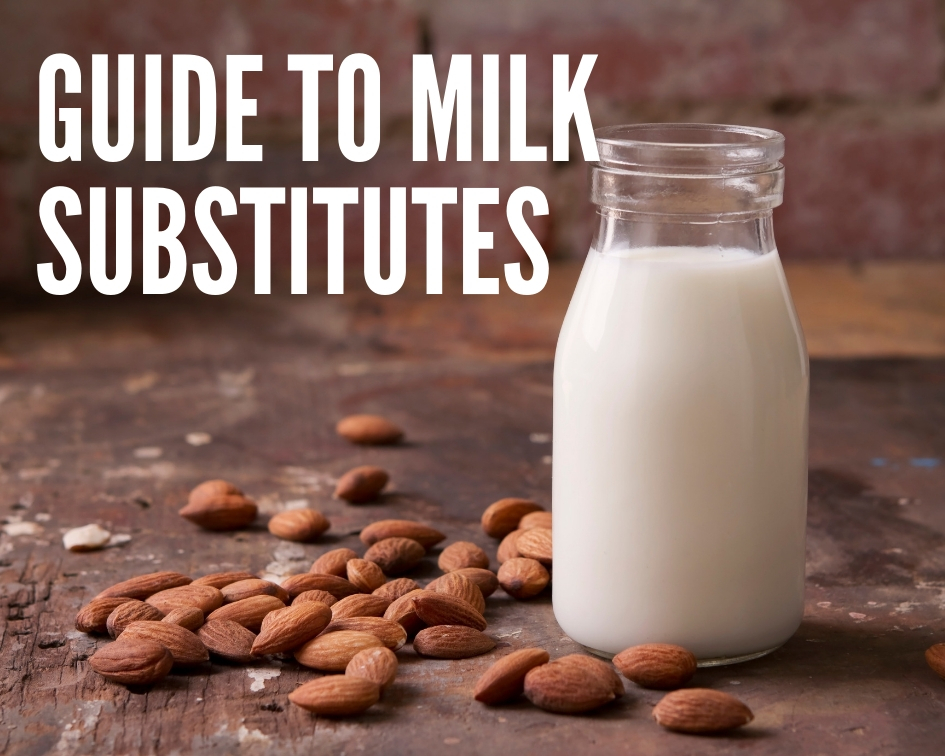You may have noticed the dairy section has exploded recently. There are now plenty of options for those with milk intolerances, milk allergies, or those who chose not to consume milk products due to environmental or animal welfare concerns (also known as vegans).
Are milk substitutes really milk at all?
Cow’s milk has been recommended as a part of a healthy diet for decades because it contains vital nutrients such as protein, potassium, Vitamin D, phosphorus, and calcium. Milk alternatives don’t always provide these nutrients, which is why the dairy industry has started heavily lobbying to prevent plant-based milk alternatives from using the word milk since they are not really milk at all.
Each type of plant-based milk has a unique nutritional profile depending on what it is initially made from and if it’s fortified. The process for producing plant-based milk includes soaking the nut, seed, beans, or grain. Then, blended with water and strained to collect the “milk.” Thickeners, preservatives, sweeteners, flavoring, and nutrients are added into the final product. Here are a few common milk substitutes you might see at your local market.
A2 Milk
Gotcha! A2 milk is commonly mistaken for a milk substitute when in fact it comes from cow’s milk. The cow’s that produce a2 milk has a slightly different protein make up than most dairy cow’s. Some people may tolerate their milk better but it’s still a dairy product.
Lactaid Milk
Gotcha again! Lactaid milk is also not a milk substitute. Lactaid milk adds the enzyme lactase so that the lactose in it is broken down before consuming. For those who have lactose intolerance, this helps them digest the milk. However, it will not help those with milk protein intolerance or allergies. The nutritional profile of the milk is the same, but the milk may taste sweeter.
Soy Milk
Soy milk has the closest make up to cows milk without fortification (adding nutrients back in). Soy milk has 8 grams of protein and 100 calories per cup in unsweetened versions. However, it’s very common for individuals who do not tolerate cow’s milk to not tolerate soy protein as well.
Almond Milk
Almond milk is an incredibly common milk substitute. It is lower in protein than cows and soy milk. There are also fewer in calories per cup (between 30-50 in unsweetened versions). Also, it is usually fortified with calcium and Vitamin D.
Coconut Milk
Coconut milk is found in cans and cartons. The carton version contains a blend of coconut cream and water and is considered a milk substitute. It contains no protein and has a higher fat than other milk substitutes (around 50 calories per cup in unsweetened varieties).
Rice and Oat Milk
Rice and oat milk are the most allergy-friendly substitutes because they do not contain dairy or nuts. Both are lower in protein and fat, but higher in carbohydrates. Unsweetened varieties provide around 100 calories per cup. Always check to make sure it’s fortified with crucial nutrients like calcium and Vitamin D before purchasing.
Flax and Hemp Seed Milk
These kinds of milk have the added benefit of providing heart-healthy inflammation fighting Omega-3 fatty acids. However, they don’t offer much protein and must be fortified to provide key nutrients. They typically have similar macro-nutrient profiles to almond milk ranging with unsweetened versions ranging from 30-50 calories per cup. Baking with these kinds of milk is not recommended due to the delicate fatty acids which can be destroyed at high heat.
Which milk is best for you?
Which milk you chose depends on if you have any food allergies, taste preference, and how you are using the milk. For example, you may use one type for coffee, another for smoothies, and a third type for baking. Also, some milk alternatives come with a heavy price tag so that may play a factor as well. As a general rule of thumb, make sure you look for fortified milk substitutes with the essential nutrients: calcium, potassium, and Vitamin D.
